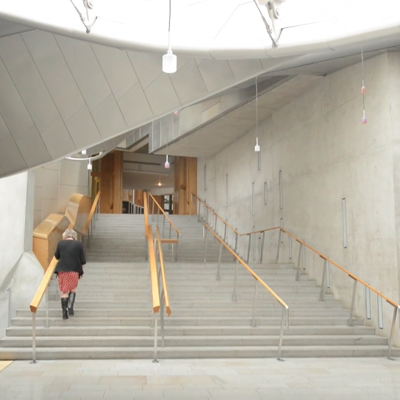Public policy highlights May 2020
Our policy committees have had a busy month analysing and responding to proposed changes in the law. We do this to positively influence the creation of a fairer and more just society through our active engagement with the Scottish and United Kingdom Governments, Parliaments, wider stakeholders and our membership.
You can read more about some of the month's highlights below:
Coronavirus (Scotland) (No.2) Bill
Following the work done on the Coronavirus Bill and Coronavirus (Scotland) Bill, the Society turned its attention to the Coronavirus (Scotland) (No.2) Bill in May. This saw consultation responses submitted, briefings issued at each stage of the Bill and Michael Clancy, Director of Law Reform and Gillian Mawdsley, Policy Executive, giving evidence to the COVID-19 Committee.
The Criminal Law Committee and Trust and Succession Committee responded to the Scottish Government’s call for views on the proposals outlined in the Bill. In addition to the areas proposed for legislative change in the consultation, the committees highlighted other areas where they believed there could be changes introduced to assist during the current crisis: police station interviews; adults with incapacity and; limitation and prescription.
On police station interviews, the committees put forward a suggested amendment to the Criminal Justice (Scotland) Act 2016 that would facilitate solicitor access at the police station, ensuring social distancing or the use of technology. This would mean an amendment to the term ‘present’ in the Act, to facilitate remote access to persons at a police station. Similarly, the consultation response proposed that clarification around the use of ‘appearance’ elsewhere in the legislation would be helpful, so that this could include attendance and/or representation by virtual or remote communication. The committees stated that they believed such clarification would be welcomed by prosecution and defence and would be in the interests of justice to retain such clarification following the current crisis.
With regards to changes to the Adults with Incapacity (Scotland) 2000 Act, the committees echoed the suggestions outlined in the letter from the Society’s President to the Cabinet Secretary of Health and Sport in April, which were documented in the Public policy highlights last month.
Finally, the consultation response put forward recommendations from the Civil Justice and Obligations committees on amendments to limitation and prescription. They proposed the disapplication of the limitation and prescription periods for the duration of the current COVID-19 situation, highlighting the benefits of doing so to debtors, consumers, creditors, the court system and the profession.
In its briefing issued ahead of the stage 1 debate, the Society emphasised the necessity of a “whole-of-government, whole-of-society approach, built around a comprehensive strategy to prevent infections, save lives and minimise impact”. Crucial to such an approach is to keep people safe in the Scottish legal system, protect the rule of law and the interests of justice, ensure that access to justice remains available and that the fundamental protections for people across Scotland through our framework of equality and human rights laws, are maintained. The Society stressed that legislative change must be lawful, necessary, proportionate, time-limited and non-discriminatory. The briefing highlighted the need to ensure that scrutiny of legislation is carried out properly and that Government is held to appropriate account and in light of a compressed timetable, there should be close post-legislative scrutiny of how the Act works in practice.
In its stage 2 briefing, the Society paid particular attention to amendment 8, which makes changes to the current law to remove the requirement for a notary public, solicitor or advocate to be personally present when a person signs a document, takes an oath or makes a solemn affirmation or declaration. The Society put forward its support for the amendment and acknowledged its gratitude to the Scottish Government for lodging it. Having carried out its own research, the Society highlighted the impediment that the current COVID-19 crisis is having on notaries fulfilling legal requirements and therefore the clear public interest in allowing the personal presence rule to be relaxed.
See all the our work on this Bill. The response to the Scottish Government's call for views can be found here.
Restarting jury trials
The Society’s consultation response acknowledged that immediate national measures were required as a result of the COVID-19 pandemic, and that it had supported the courts’ closure in March 2020 to protect lives and to avoid the spread of the virus. In light of the recently proposed phased return to a ‘new normal’, the Society emphasised the need to restart all criminal business as a priority. It stated that the focus lies with solemn business, involving a wide range of cases. Solutions under consideration for restarting such trials have inevitable implications for other criminal business, including the availability of judges and other court (both civil and criminal) business. The Society noted that safety for all involved in the court is paramount, and measures must be put in place in accordance with ongoing and emerging health advice in ensuring the requirements for social distancing.
In adopting a flexible solution, the Society proposed the following as significant:
- Accommodation to undertake solemn trials is available
- Technology exists
- Motivation exists across the profession, both prosecution and defence, to be proactive
- There is an urgency in restarting these trials. To do nothing and increase any backlog is unsustainable.
- Monitoring the solution is essential as is obtaining evaluation and feedback
- Now is not the time to fundamentally change the Scottish criminal justice system by instituting judge only solemn trials
- Maintaining jury trials is our preference in seeking to make practical changes.
The Society welcomed the announcement by the Working Group led by Lady Dorrian that jury trials are to restart in July.

